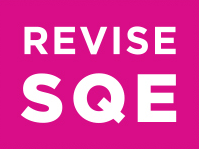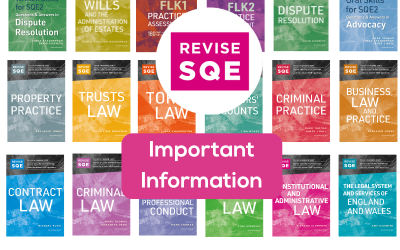At Revise SQE, we take accuracy seriously and work hard to ensure our SQE revision guides are as clear and reliable as possible. Despite our robust editorial processes, a few errors have been spotted—thanks to the sharp eyes of our readers, and we’re genuinely grateful for their feedback.
To support students using earlier editions, we’ve compiled a list of corrections so they can easily make notes in their books.
Looking ahead, we’ve strengthened our editorial team and are now committed to annual updates to keep our guides accurate and up to date. Corrections are shown in bold.
| Title | Page | Correction |
| Tort | P 92, Q5
P 95, A5 |
C. The court is likely to make a finding of 15% contributory negligence as the claimant has contributed to her injuries by failing to wear a seatbelt.
The correct answer was C. This is because the court will make a finding of 15% contributory negligence as the claimant’s injuries would have been less severe had she worn a seatbelt. |
| Tort | P 41 Practice example 2.1 | Case name Sienkiewicz v Greif Ltd [2011] UKSC 10 |
| Business Law | P 50
Line 5 |
Replace MA 13(3) and (4) with MA 14(3) and (4) |
| Business Law | P 29 text and Practice example 2.6 | ‘Which partners are liable?’
(para 2) Partners are jointly liable for the debts … (para 3) … how joint liability works (practice example) Ulrika is … jointly liable |
| Dispute Resolution | P 46 Practice example 3.2 | The second business day after the document is posted is Tuesday (as Saturday and Sunday are not counted as business days and Monday is the first business day after service). The claim form and particulars of claim will therefore be deemed served on Tuesday 16 May. |
| Constitutional Law | P 81 | ‘Bills affecting only England or only England and Wales’
Omit |
| Ethics | P 38
Exam warning |
Add:
In practice, it is advisable to always pay/offset any commission or referral fee to clients. This ensures the solicitor acts in the best interests of the client, irrespective of the technical ability to obtain their consent. |
| Criminal Practice | P 134
Fig 6.2 |
Section 35 inferences
Was it undesirable for the defendant to give evidence due to a mental or physical impairment? YES > Inferences MAY NOT be drawn
|
| Criminal Practice | P 250
Answer 4) |
A DTO no longer needs to be imposed for a fixed period (ie 4, 6, 8, 10, 12, 18 or 24 months), providing that the period is between 4 and 24 months. |

